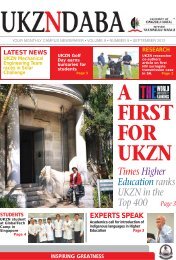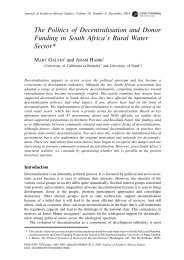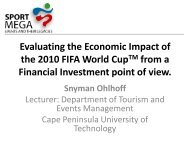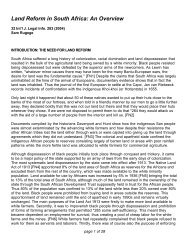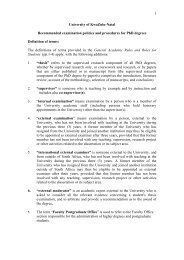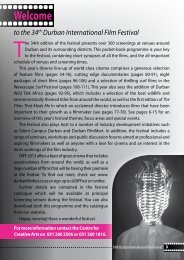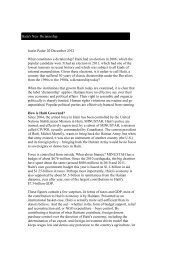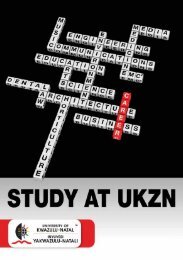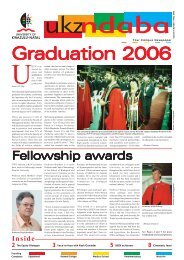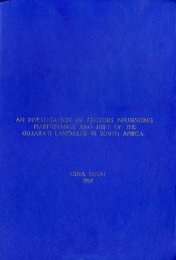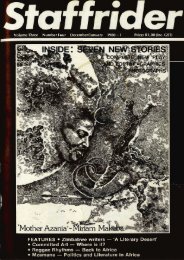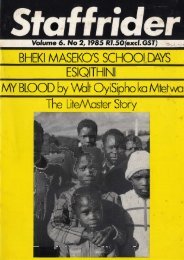UKZNDABA April 2011.indd - University of KwaZulu-Natal
UKZNDABA April 2011.indd - University of KwaZulu-Natal
UKZNDABA April 2011.indd - University of KwaZulu-Natal
Create successful ePaper yourself
Turn your PDF publications into a flip-book with our unique Google optimized e-Paper software.
Exposure Dialogue Programmeinteracts with communitiesPr<strong>of</strong>essor Imraan Valodia<strong>of</strong> UKZN’s School <strong>of</strong>Development Studies (SDS)hosted a meeting <strong>of</strong> the Exposureand Dialogue Programme (EDP) inDurban from March 19-23.The EDP is a joint initiative <strong>of</strong>the research and policy networkWIEGO (Women in InformalEmployment: Globalising andOrganising), Cornell <strong>University</strong>in Ithaca, USA and the SelfemployedWomen’s Association(SEWA) – a union <strong>of</strong> women inthe informal economy, based inAhmedabad, India. Valodia andPr<strong>of</strong>essor Francie Lund, also <strong>of</strong>Ma Mildred Ngidi, economist Pr<strong>of</strong>essor Ravi Kanbur, and facilitator Ms Sibongile Mkhize working in MaNgidi’svegetable garden.UMTAPO WOLWAZI EHOWARD COLLEGE UGUBHAIVIKI LOMTAPO WOLWAZI ENINGIZIMU AFRIKAIviki lomtapo wolwazi eNingizimu Africa ligujwe ngempumelelo emtapeni wolwazieHoward College.UMBHALI: ANDREA VORSTERIsiqubulo somgubhowangalonyaka besithi “Fundaemtapeni wakho ngolimulwakho”. Umtapo wolwazi eHowardCollege i-EG Malherbe Libraryikhangise izincwadi ezigaywei-UKZN Press, kakhulukazi lezoezibhalwe ngezilimi zomdabu zase-Africa. Kulomboniso bekubalwakuwo iCD yembongi nombhaliowaziwayo uGcina Mhlophe ebizwangokuthi iSongs and Stories <strong>of</strong> Africaeyazitholela isabelo kuma SouthAfrican Music Awards ne PanSALBawards ngokubhala ngesiZulunange siXhosa kusuka oliminilwesiNgisi. Omunye owaphumelelakanye noMhlophe ngu WilliamNdabayakhe Zulu ngokubhalangesiZulu incwadi yomlandowakhe ethi “Liyoze Line Ngakithi”the SDS, are both members <strong>of</strong>the WIEGO team participatingin the EDP.The objective <strong>of</strong> the EDP is tocontinue and develop a dialoguebetween labour economists,SEWA activists, and WIEGOresearchers which began in 2003with an EDP in Ahmedabad.Each dialogue is organisedaround a set <strong>of</strong> exposures, whereresearchers live with and do thework <strong>of</strong> informal workers who actas hosts to the researchers. Theresearchers get a detailed and‘on-the-ground’ understanding<strong>of</strong> the lives <strong>of</strong> informal workers.The EDP team in Durbaneyayibhalwe ngesiNgisi ithi “Springwill Come”.Imigubho eHoward Collegeivulwe ngenkulumo eyakhayokaDokotela Lungile BhenguBaloyi ethatha encwadiniyakhe ethi African Midwife:Change beyond form ekhulumangokunakekela ubuwenanangokulapha ngezenzo.Lomyalezo ugcizelelwenguMnumzane Jeff Mkhizeovela ejele lase Westvilleogcizelele ngokuziphathakwabantu emphakathiniwabe esemukela inqwabayezincwadi aziphiwe iHowardCollege Libraries.Kuleliviki abasebenzisibomtapo wolwazi waseNyuvesi balisebenzisile ithubalikashwele kulabo abakweletawas hosted by MaNgidi, aninformal worker in Umzinyathiwho earns her living through acombination <strong>of</strong> block-makingand small-scale agriculture;Mrs Dladla who works in awomen’s co-operative makingschool uniforms; Choma-ChomaNolushaka, a DRC refugee whoworks as a street barber; MrsNtombela who is a member <strong>of</strong>an agriculture co-operative inEngonyameni; MaSibisi, a craftworker who lives in Shongweni;and Ms Nomusa Koko, a foodvendor at Durban Station.izimali ngenxa yokubuyisaizincwadi sesidlulile isikhathi.Umboniswano ngezocwaningonokudayisa izincwadi ezindalakudonse abantu abaningifuthi bekusizwa abafundinabasebenzi iviki lonke.Ukugubha usikolaseNingizimu Africa lokufunda,iHoward College Librariesiliqinikisekile iqhaza laloelilibambayo emphakathinionamalungelo nonezilimieziningi ukukhumbuza abafundinabasebenzi ngomnotho wolwaziotholakalayo nokubalulekakomtapo wolwazi ukukhuthazaukufunda eNingizimu Africa.See Page 3 for the English translation<strong>of</strong> this article.ACFS Directorhas faith in AfricaUKZN’s Faculty <strong>of</strong> Science and Agriculture recentlywelcomed the new Director <strong>of</strong> its African Centre forFood Security (ACFS), Pr<strong>of</strong>essor Ayalneh Bogale.WORDS & PHOTO: VICKY CROOKESBogale has been forced tohit the ground runningas the Centre has beenstruggling for the past year withouta permanent leader. AlthoughDr Joyce Chitja, assisted by DrUnathi Kolanisi, has more thanably kept the ship afloat as ActingDirector, she has had to makeenormous sacrifices to do so,juggling her teaching and researchresponsibilities.Uppermost on Bogale’sagenda is a Memorandum <strong>of</strong>Understanding (MoU) betweenUKZN, the South African DevelopmentCommunity (SADC)and five other African universities.The SADC MoU was successfullyinitiated and facilitatedby Chitja during her acting tenure.The partnerships will focuson building a critical mass <strong>of</strong>African expertise in the area <strong>of</strong>vulnerability assessment, analysisand advocacy relating to foodinsecurity.Bogale emphasised the needto understand food insecurity atthe household level. He said thateven though South Africa mayhave a food surplus at the nationallevel, this does not ensure foodsecurity at the household level.In fact, he believes that no onenation in the world is immune t<strong>of</strong>ood insecurityAccording to Bogale, foodsecurity has become worse insub-Saharan Africa over thepast few decades. Householdsare vulnerable to shocks suchas climate variability which, inone season, can leave millions<strong>of</strong> people deprived <strong>of</strong> food. Thesolution – capacitate householdsto be able to access food bycreating jobs, finding alternateways <strong>of</strong> attaining money forfood, and increasing foodproduction to bring down foodprices. Countries’ leaders alsohave a critical role to play as,in most case, an insufficientproportion <strong>of</strong> their budgets isallocated to the agriculturalsector, despite it being themain driver <strong>of</strong> their economies.However, Bogale said it isheartening to see many Africanleaders and decision makersparticipating in forums such asthe NEPAD’s ComprehensiveAfrica Agriculture DevelopmentProgramme (CAADP) whichis an African-led initiative toboost agricultural productivityin Africa. UKZN’s ACFS is thelead agency in CAADP’s PillarIII which is focused on FoodSupply and Food Security.Having held the positions <strong>of</strong>Director <strong>of</strong> Research Partnershipsand Associate Pr<strong>of</strong>essor inAgricultural and Resources Economicsat Alemaya <strong>University</strong> inEthiopia, Bogale is no strangerto the demands <strong>of</strong> heading upsuch an influential and importantcentre. Although permanentlylocated in Ethiopia overthe past years, he has travelledextensively and has close workingrelationships with many Africanuniversities. He understandshow South African universitiesoperate and has the advantage <strong>of</strong>having worked with the <strong>University</strong><strong>of</strong> Pretoria since 2003. Themost challenging aspect <strong>of</strong> hiscurrent position will be puttingan effective network in place.questioned about Africa’sfuture, Bogale was extremelyoptimistic, ‘There is great hope– if resources are appropriatelyused, there is no single countryin Africa which cannot produceand feed its population. Studiesshow that Africa can feed itself… if we put in the effort, wedon’t need to suffer from foodinsecurity,’ said Bogale.The new Director <strong>of</strong> the African Centre for Food Security, Pr<strong>of</strong>essorBogale, (right) interacts with Dr Chitja who occupied the post in anacting capacity while it was vacant.2 U K Z N D A B A B R I N G I N G Y O U N E W S F R O M U N I V E R S I T Y O F K W A Z U L U - N A T A L C A M P U S E S
Howard College Libraries celebrateSouth African Library WeekSouth African Library Week was celebrated with much success at the HowardCollege Libraries.WORDS: ANDREA VORSTERIn line with the national theme“Read in your language @yourlibrary”, a display <strong>of</strong> materialspublished by the UKZN Presswas presented in the foyer <strong>of</strong> EGMalherbe Library, focusing on avariety <strong>of</strong> materials published inindigenous African languages.The display included renownedstory teller and performerGcina Mhlope’s Sama Awardwinning Audio CD Songs and Stories<strong>of</strong> Africa, which also receivedthe PanSALB awards for translationfrom English into isiZuluas Umcelo Nezindaba Zase-Afrikaand Xhosa as Umcelo NeentsomiZase-Afrika. Sharing the awardwas William Ndabayakhe Zulufor his autobiography publishedby the UKZN Press, Liyoze LineNangakithi, an isiZulu adaptation<strong>of</strong> his English autobiography,Spring Will Come.The programme <strong>of</strong> eventsat Howard College Librariescommenced with an inspiringtalk by Dr Lungile Bhengu Baloyiwho, drawing from her bookAfrican Midwife: Change beyondform, conveyed a positive message<strong>of</strong> personal responsibility andan attitude <strong>of</strong> healing throughexpression.This message was taken up byOfficer Jeff Mkhize, representingWestville Prison CorrectionalServices, who emphasised socialresponsibility as he gratefullyaccepted a large donation <strong>of</strong>books from Howard CollegeLibraries.UKZN library users took advantage<strong>of</strong> the annual “amnesty”period that allowed an exemptionfrom fines for all late returnsduring the week. Several researchdatabase presentations and videosprovided practical assistanceto students and academic staffthroughout the week, culminatingin a sale <strong>of</strong> discarded items ina variety <strong>of</strong> subjects. The saleattracted a number <strong>of</strong> interestedand eager members <strong>of</strong> the<strong>University</strong> community.In celebration <strong>of</strong> the country’sliterary tradition, HowardCollege Libraries’ confirmedits role within a democratic andmultilingual society, remindingboth staff and students, aswell as the wider community,<strong>of</strong> its invaluable resources,while marketing libraries as afoundation for the development<strong>of</strong> a reading and learning culturein South Africa.UKZN Press authors winMultilingualism AwardTwo authors published by the UKZN Press were joint winners in this year’s“Language and Literature” category in the PanSALB Multilingualism Awards.WORDS: LUNGA MEMELA PHOTO: SUPPLIEDMagwaza women with their ceramic vessels.UKZN Pr<strong>of</strong>essorempowers rural womenFor the past ten years, Pr<strong>of</strong>essor Juliet Armstrong, anAssociate Pr<strong>of</strong>essor at UKZN’s Centre for Visual Art, hasled a community engagement programme which isbenefiting women in the kwaMagwaza village about50km from Kranskop in <strong>KwaZulu</strong>-<strong>Natal</strong>.WORDS: LUNGA MEMELA PHOTO: SUPPLIEDWilliam Ndabayakhe Zulu and Gcina Mhlophe.The “Language andLiterature” category is opento writers who help topromote and preserve South Africa’s<strong>of</strong>ficial languages. World-renownedstory-teller and performer, GcinaMhlophe, was awarded the prize forher translation <strong>of</strong> her CD, Songs andStories <strong>of</strong> Africa, into isiZulu (UmceloNezindaba Zase-Afrika) and isiXhosa(Umcelo Neentsomi Zase-Afrika).William Ndabayakhe Zuluwon the award for hisautobiography, Liyoze LineNangakithi, an isiZulu adaptation<strong>of</strong> his English auto-biography,Spring Will Come, which wasrunner-up in the Sunday TimesAlan Paton Award in 2006.PanSALB (the Pan SouthAfrican Language Board) wasestablished to promote the equaluse <strong>of</strong> the 11 <strong>of</strong>ficial SouthAfrican languages and to helpdevelop the country’s indigenouslanguages. It actively promotesmultilingualism as a nationalresource and a vehicle fornational development.‘Multilingualism is a threadthat binds us together,’ said Zulu.Excited to have won the award,he commented on the scarcity<strong>of</strong> autobiographies in the isiZululanguage and said he was happyto have published his life-story inhis own language.‘We need to train youngtranslators to enjoy translation,’said Mhlophe, who describedherself as ‘super passionate’about multilingualism. She saidit was important that SouthAfricans celebrate all languages,adding that she was honoured tohave won the award.The UKZN Press publisheshigh-quality, scholarly worksin a range <strong>of</strong> subjects includingsociology, politics and politicalscience, economics, history, genderstudies, current affairs, thenatural sciences, literature andselected novels and biographicalworks.The women, who arebreadwinners and widows,make a living from creatingceramic vessels used for theceremonial drinking <strong>of</strong> utshwala(sorghum beer).The Magwaza women digthe clay from the mountains andmake, design and fire differenttypes <strong>of</strong> Zulu serving, storage anddisplay pottery for the drinking<strong>of</strong> sorghum beer. Armstronghas encouraged these womennot to moderate, but to prevail,prevent and protect their work’sauthenticity as it is their history.Armstrong has establishedcontact with galleries in SouthAfrica and abroad for theZulu pottery to be displayedand traded. She said there is agrowing demand for the pottery.One <strong>of</strong> the project’s highlightshas been the recent opportunity,secured by Armstrong, todisplay some <strong>of</strong> their craft atthe Singapore Botanic Gardens,which has been connectingpeople and plants for more than150 years.Armstrong said that more<strong>of</strong>ten than not, people comeinto communities such as themPabalane area and exploitinstead <strong>of</strong> develop talent. TheMagwaza women have flown to,traded and exhibited their craftin the likes <strong>of</strong> Port Elizabeth andthe United States <strong>of</strong> Americaamong others. They also visitmuseums and gallery exhibitionsand conduct workshops thatequip the Magwaza women withbusiness acumen and other ideas.A grateful Mrs Magwaza<strong>of</strong> the village reported that asa result <strong>of</strong> the project, she hasmanaged to send one <strong>of</strong> herchildren to study at the Durban<strong>University</strong> <strong>of</strong> Technology.On March 10, Visual Artexchange students from theUSA undertook a field tripto mPabalane. CommunityEngagement Officer forthe Faculty <strong>of</strong> Humanities,Development and SocialSciences at UKZN, Mr SiphiweMngwengwe, who accompaniedthe students, said it was amemorable and enjoyablelearning experience.On that day, more thanR6 000 was paid to the Magwazawomen; R2 000 from the potterysold by Armstrong, and R4 000from sales on the day.E D G E W O O D • H O W A R D C O L L E G E • M E D I C A L S C H O O L • P I E T E R M A R I T Z B E R G • W E S T V I L L E U K Z N D A B A 3
Mechanical Engineerstackle Tugela Raft RaceThe 2011 Tugela Raft Race provided the ideal opportunity for UKZN’s mechanicalengineers to put their design skills to good use and to work together to produce astate-<strong>of</strong>-the-art barrel raft for the annual competition.Biologists Unearthnew SpeciesMeet what may be the newest species to the endemicAfrican-Arabian genus Gomphocarpus.WORDS & PHOTO: SUPPLIEDWORDS: VICKY CROOKES PHOTO: SUPPLIEDThe race, which is a MandiniRound Table event, tookplace on <strong>April</strong> 2 on the<strong>KwaZulu</strong>-<strong>Natal</strong> north coast. Mastersstudent and Lecturer, Miss KirstyVeal is still awaiting confirmation,but is almost certain that the UKZNteam won the Best Raft AwardThis year’s race theme was“Doctors and Nurses” and theUKZN team, comprising staffand students, constructed a minihospital on their raft, completewith curtains – to protect teammembers from the eggs that arethrown around. ‘All the raftsare home built; most <strong>of</strong> them arelarge chunks <strong>of</strong> polystyrene, butthere are a few people, like us,who put effort into it,’ said Veale.The team worked on the raft forsix weeks, devoting three nightsa week to their project. The mainframe was constructed last yearand was re-used, with a bit <strong>of</strong> tinkering,but the hospital part wasbuilt from scratch.The race took in 17 kilometers<strong>of</strong> a slow moving stretch <strong>of</strong>the Tugela River, starting at theMandini Sports Grounds. Loadedwith 12 people, three mechanicalengineering lecturers, fivepostgraduate students and fourfriends, the UKZN raft startedthe race by being bombardedwith eggs and flour from fellowcompetitors. Along the way it accumulatedan extra six peoplewhen the team rescued anotherraft, manned by non-swimmers,which had tipped over. Anddespite the raft catching on firefrom a braai on board, the teamarrived safely at the finish fivehours after they had started.Even though Head <strong>of</strong> School,Pr<strong>of</strong>essor Glen Bright, was unableto participate in the eventdue to a knee operation, theUKZN team received his fullbacking. Bright said it was thesecond year on a row that theSchool had participated in thecompetition and that it is a greatway to build team spirit.GSB Participatesin BRICS AssociationWhilst South Africa is yet to sign the BRICS (Brazil, Russia, India, China grouping)agreement, academia has paved the way by creating the Association <strong>of</strong> BRICSBusiness Schools (ABBS).WORDS: ANESH SINGH PHOTO: SUPPLIEDUKZN’s Graduate School <strong>of</strong>Business (GSB) was one<strong>of</strong> the eight foundinginstitutions. ‘The purpose <strong>of</strong> ABBSis to forge academic links betweenthe BRICS countries and to stimulatediscourse, discussion and debateon business, leadership andmanagement issues’ said the Head<strong>of</strong> the GSB, Pr<strong>of</strong>essor Anesh Singh.This new species wascollected on a fieldtripundertaken by Pr<strong>of</strong>essorAshley Nicholas and two <strong>of</strong> his PhDstudents, Ms Melissa and Ms ReneGlen, from the School <strong>of</strong> Biologicaland Conservation Sciences on theWestville campus.Travelling in an anticlockwisecircuit around the base <strong>of</strong> theDrakensberg mountains, thesescientists collected in many almostinaccessible areas <strong>of</strong> the mountainmassif. Besides the discovery <strong>of</strong>a possible new endemic species<strong>of</strong> South African Gomphocarpus,this scientific trip also producedseveral new distribution recordsfor Aponogeton junceus (one <strong>of</strong> the‘waterblommetjies’), includingthe first record <strong>of</strong> this species forthe Free State.New records were also made<strong>of</strong> Lagarosiphon major (Oxygenplant), Potamogeton trichoides andP. thunbergia-complex. Thesethree aquatic genera belong toan ancient order <strong>of</strong> plants, theAlismatales, which had its originssome 130 million years ago; at atime when dinosaurs still roamedthe Earth. It is this archaic andtaxonomically complex order<strong>of</strong> flowering plants that is thefocal point <strong>of</strong> the work beingundertaken by Rene Glen. Hergroup <strong>of</strong> plants also contains theonly known marine angiosperms;a bizarre and little understoodevolutionary line.Other scientifically importantrecords included Pachycarpusrigidus a member <strong>of</strong> the morerecently evolved and florallyintricate family Apocynaceae. Thisbeautiful species was found nearRhodes in the Eastern Capeand it is only the second time ithas been collected in the past 40years! Members <strong>of</strong> the Apocynaceae(the milkweeds) are the topic<strong>of</strong> Melissa Glen’s research.She collected both herbariumspecimens and DNA samples;these will be used to producean evolutionary tree based onseveral genes found within thefamily. The sequencing <strong>of</strong> thesegenes is being supervised by andperformed in the laboratory <strong>of</strong>Pr<strong>of</strong>essor Jenny Lamb on theWestville campus.This successful scientificexpedition was not without itsdrama and challenges, as thealmost incessant rain had causedextensive flooding throughoutthe region; which lead to somehair-raising moments. Scientificexpeditions such as these arealso part <strong>of</strong> the <strong>University</strong>’scommitment to communityengagement. They serve tostrengthen connections andrelationships between UKZNand the inhabitants <strong>of</strong> remoteareas. Local mountain residents,farmers and game guards werealways willing to help andsometimes quite amused by theantics and excitement <strong>of</strong> theUKZN botanists as they oohedand aahed over strange littleplants growing in shallow waterand on muddy hillsides.Due to the extremely highextinction rate experiencedglobally at both the population andspecies level, these explorations,and associated genetic work,come at an essential time inSouth Africa’s history. They willcontribute to our understanding<strong>of</strong> these two major plant groups.The <strong>University</strong>’s involvement inthe taxonomy <strong>of</strong> these rare andwonderful South African plantswill eventually play a major rolein their conservation.Shantou <strong>University</strong> BusinessSchool was the venue for thisyear’s 2011 Biennial Conference<strong>of</strong> the ABBS, the focus <strong>of</strong>which was “The Responsibility<strong>of</strong> Young Managers under Globalisation”.Topical issues on theagenda included multiculturalpreparedness, sustainability, corporatesocial responsibility in thewake <strong>of</strong> globalisation, and s<strong>of</strong>tskills for new global managers.Mr Steven Msomi, a GSBlecturer said, ‘The factory visits,opened my eyes to the state <strong>of</strong>the art Chinese engineering andLeft to Right: Ms Risper Kiaye, Mr Robin Pooley, Ms Ashena Ramloutan, MrSteven Msomi, and Pr<strong>of</strong>essor Anesh Singh at the Conference.production abilities and I learnta lot.’Mr Robin Pooley, an MBAstudent, was proud to be a part<strong>of</strong> the UKZN GSB team. ‘Theconference was an opportunityfor students to watch what wasbeing done by businesses inthe largest emerging economyon the planet. The conferencealso provided an opportunityto foster relationships and buildpartnerships that would benefitall our countries,’ he said.For Singh the proudestmoment was when, ‘TeamSouth Africa, represented by the<strong>University</strong> <strong>of</strong> <strong>KwaZulu</strong>-<strong>Natal</strong>,won the audience popularityaward for their case study onKulula.com.’The beautiful and rare, mountain loving, Pachycarpus rigidus.E D G E W O O D • H O W A R D C O L L E G E • M E D I C A L S C H O O L • P I E T E R M A R I T Z B E R G • W E S T V I L L E U K Z N D A B A 5



